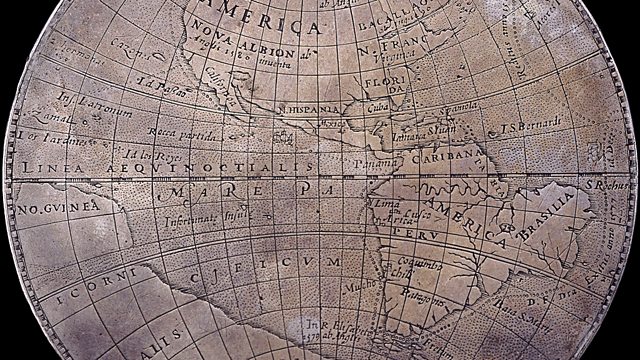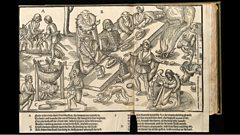7. Ireland: Failures in the Present
Neil MacGregor explains how a rare woodcut reveals the troubles and tragedies of Elizabethan Ireland. From 2012.
A rare woodcut offers a equally rare visual impression of the troubles and tragedies of Elizabethan Ireland.
Object-based history series presented by Neil MacGregor, former Director of the British Museum.
Taking artefacts from William Shakespeare's time, he explores how Elizabethan and Jacobean playgoers made sense of the unstable and rapidly changing world in which they lived.
With old certainties shifting around them, in a time of political and religious unrest and economic expansion, Neil asks what the plays would have meant to the public when they were first performed.
He uses carefully selected objects to explore the great issues of the day that preoccupied the public and helped shape the works, and he considers what they can reveal about the concerns and beliefs of Shakespearean England.
Producer: Paul Kobrak
First broadcast on �鶹������ҳ��� Radio 4 in April 2012.
Last on
More episodes
Previous
A Dangerous Image of Ireland
Date: 1581 ��
Size: H:205mm, W:320mm ��
Made in: London ��
Made by: John Derricke ��
Material: Paper
��
Why is it that Shakespeare gave us a Scottish play, and Scottish and Welsh characters in abundance, and yet in his entire works there is only one Irish character?
��
The answer has much more to do with national politics than artistic inspiration. The war in Ireland was the great military crisis of the Elizabethan regime – almost resulting in failure for England – and as a result it was a topic prone to censorship.
��
While we can glean a lot about the issues presented by Ireland from the many references in Shakespeare’s plays, this book, The Image of Ireland, published in 1581, perhaps allows us best to reconstruct what his audience might have known and thought about the Irish.
And if you’re still wondering who the one Irish character is, then you’ll have to listen to the programme…
��
This object is from
��
Quotations
��
'The Duke of York is newly come from Ireland,/And with a puissant and a mighty power/Of gallowglasses and stout kerns/Is marching hitherward in proud array.' �� Henry VI part 2, Act 4 Scene 9Background
- The scarcity of Irish artefacts from this period makes Derricke's work one of the leading sources for the Irish experience in the late Tudor age
- The plates tell the story of the subjugation of Irish rebels by Sir Henry Sidney, Lord Deputy of Ireland, detailing his triumphs against the native Irish - many probably witnessed by the author
- Derricke's plates have been called the finest woodcuts made in a 16th century English book
- Only one Irish character appears in a play by Shakespeare - Captain Macmorris in Henry V (and he's actually Anglo-Irish)
- A lot of academic ink has been spilled on what was meant by Macmorris' expostulation on 'What ish my nation?' in Henry V, Act 3 Scene 2
More from Radio 4: Elizabeth I and Ireland

By the 16th Century, Ireland had become a problem for the British. Narrated by Juliet Stevenson, with readings by Anna Massey, Robert Powell and Rob Brydon.
��
More from Radio 4: Martin Frobisher and Fool's Gold

The history of British explorers and routes to China in the 1570s. Narrated by Juliet Stevenson.
��
More from Radio 4: The Plantation of Ireland in The Counties of Armagh and Tyrone

Melvyn Bragg travels to Northern Ireland to investigate the lot of the native Irish workers at the end of Elizabethan era and the history of the Ulster Plantation.
��
Broadcasts
- Tue 24 Apr 2012 13:45�鶹������ҳ��� Radio 4
- Tue 24 Apr 2012 19:45�鶹������ҳ��� Radio 4
- Tue 16 Oct 2012 14:15�鶹������ҳ��� Radio 4 Extra
- Tue 17 Mar 2015 14:15�鶹������ҳ��� Radio 4 Extra
- Wed 18 Mar 2015 00:15�鶹������ҳ��� Radio 4 Extra
- Mon 20 Jun 2016 13:45�鶹������ҳ��� Radio 4
- Tue 24 Apr 2018 14:15�鶹������ҳ��� Radio 4 Extra
- Wed 25 Apr 2018 02:15�鶹������ҳ��� Radio 4 Extra
- Tue 24 Oct 2023 07:15�鶹������ҳ��� Radio 4 Extra
- Tue 24 Oct 2023 12:15�鶹������ҳ��� Radio 4 Extra
- Tue 24 Oct 2023 17:15�鶹������ҳ��� Radio 4 Extra
- Wed 25 Oct 2023 02:15�鶹������ҳ��� Radio 4 Extra
Podcast
-
![]()
Shakespeare's Restless World
Neil MacGregor uncovers the stories 20 objects tell us about Shakespeare's world.



